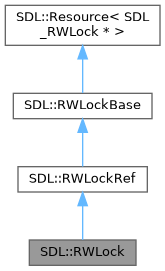Handle to an owned rWLock. More...

Public Member Functions | |
| void | Destroy () |
| Destroy a read/write lock created with RWLock.Create(). | |
| RWLockShared | share () |
| Move this rWLock into a RWLockShared. | |
| constexpr | ResourceUnique (std::nullptr_t=nullptr) |
| Default constructor. | |
| constexpr | ResourceUnique (base::value_type value, DELETER deleter={}) |
| Constructs from raw type. | |
| constexpr | ResourceUnique (ResourceUnique &&other) |
| Move constructor. | |
| ResourceUnique (const ResourceUnique &other)=delete | |
 Public Member Functions inherited from SDL::ResourceUnique< RWLockRef > Public Member Functions inherited from SDL::ResourceUnique< RWLockRef > | |
| constexpr | ResourceUnique (std::nullptr_t=nullptr) |
| Default constructor. | |
| constexpr | ResourceUnique (base::value_type value, DefaultDeleter< RWLockRef > deleter={}) |
| Constructs from raw type. | |
| constexpr | ResourceUnique (ResourceUnique &&other) |
| Move constructor. | |
| ResourceUnique (const ResourceUnique &other)=delete | |
| ~ResourceUnique () | |
| Destructor. | |
| constexpr ResourceUnique & | operator= (ResourceUnique other) |
| Assignment operator. | |
| void | reset () |
| Resets the value, destroying the resource if not nullptr. | |
 Public Member Functions inherited from SDL::ResourceOwnerBase< RESOURCE, DELETER > Public Member Functions inherited from SDL::ResourceOwnerBase< RESOURCE, DELETER > | |
| RESOURCE | release () |
| Returns reference and reset this. | |
 Public Member Functions inherited from SDL::ResourcePtrBase< RESOURCE > Public Member Functions inherited from SDL::ResourcePtrBase< RESOURCE > | |
| constexpr | operator bool () const |
| Check if not null. | |
| constexpr bool | operator== (const ResourcePtrBase &other) const |
| Comparison. | |
| constexpr bool | operator== (std::nullptr_t) const |
| Comparison. | |
| constexpr bool | operator== (std::nullopt_t) const |
| Comparison. | |
| constexpr reference | operator* () const |
| Gets reference. | |
| constexpr const reference * | operator-> () const |
| Gets addressable reference. | |
| constexpr reference * | operator-> () |
| Gets addressable reference. | |
| reference | get () const |
| Get reference. | |
Static Public Member Functions | |
| static RWLock | Create () |
| Create a new read/write lock. | |
Additional Inherited Members | |
 Public Types inherited from SDL::ResourceOwnerBase< RESOURCE, DELETER > Public Types inherited from SDL::ResourceOwnerBase< RESOURCE, DELETER > | |
| using | deleter = DELETER |
| The deleter type. | |
 Public Types inherited from SDL::ResourcePtrBase< RESOURCE > Public Types inherited from SDL::ResourcePtrBase< RESOURCE > | |
| using | reference = RESOURCE |
| The reference resource type. | |
| using | value_type = typename reference::value_type |
| The raw resource type. | |
 Protected Member Functions inherited from SDL::ResourceOwnerBase< RESOURCE, DELETER > Protected Member Functions inherited from SDL::ResourceOwnerBase< RESOURCE, DELETER > | |
| constexpr | ResourceOwnerBase (base::value_type value={}, DELETER deleter={}) |
| Constructs from raw type. | |
| void | free () |
| Frees resource. | |
 Protected Member Functions inherited from SDL::ResourcePtrBase< RESOURCE > Protected Member Functions inherited from SDL::ResourcePtrBase< RESOURCE > | |
| constexpr | ResourcePtrBase (value_type value={}) |
| Constructs from raw type. | |
| reference & | get () |
| Get reference. | |
Detailed Description
Member Function Documentation
◆ Create()
|
inlinestatic |
A read/write lock is useful for situations where you have multiple threads trying to access a resource that is rarely updated. All threads requesting a read-only lock will be allowed to run in parallel; if a thread requests a write lock, it will be provided exclusive access. This makes it safe for multiple threads to use a resource at the same time if they promise not to change it, and when it has to be changed, the rwlock will serve as a gateway to make sure those changes can be made safely.
In the right situation, a rwlock can be more efficient than a mutex, which only lets a single thread proceed at a time, even if it won't be modifying the data.
All newly-created read/write locks begin in the unlocked state.
Calls to RWLockRef.LockForReading() and RWLockRef.LockForWriting will not return while the rwlock is locked for writing by another thread. See RWLockRef.TryLockForReading() and RWLockRef.TryLockForWriting() to attempt to lock without blocking.
SDL read/write locks are only recursive for read-only locks! They are not guaranteed to be fair, or provide access in a FIFO manner! They are not guaranteed to favor writers. You may not lock a rwlock for both read-only and write access at the same time from the same thread (so you can't promote your read-only lock to a write lock without unlocking first).
- Returns
- the initialized and unlocked read/write lock or nullptr on failure; call GetError() for more information.
- Since
- This function is available since SDL 3.2.0.
◆ Destroy()
|
inline |
This function must be called on any read/write lock that is no longer needed. Failure to destroy a rwlock will result in a system memory or resource leak. While it is safe to destroy a rwlock that is unlocked, it is not safe to attempt to destroy a locked rwlock, and may result in undefined behavior depending on the platform.
- Since
- This function is available since SDL 3.2.0.
- See also
- RWLock.Create
The documentation for this struct was generated from the following file:
- SDL3pp/SDL3pp_mutex.h